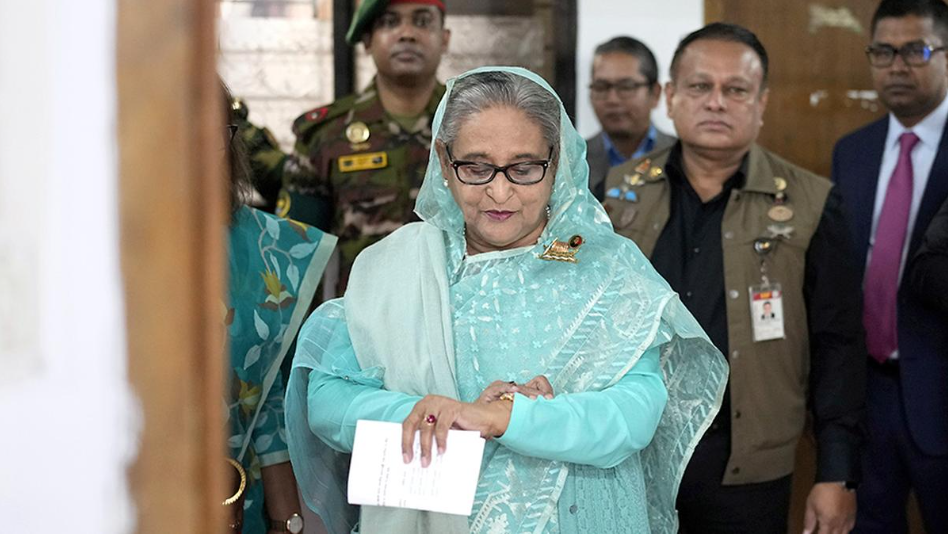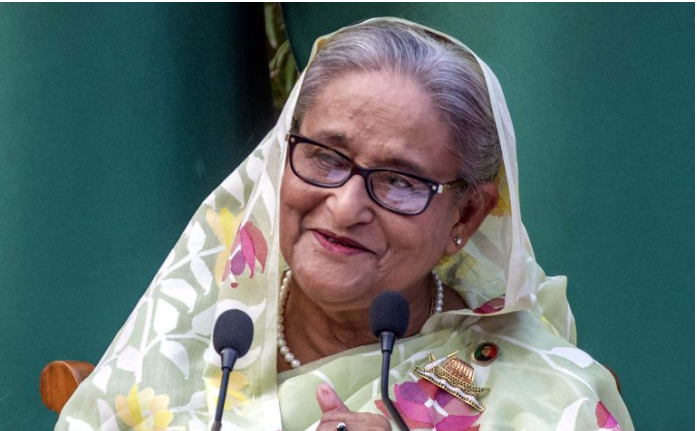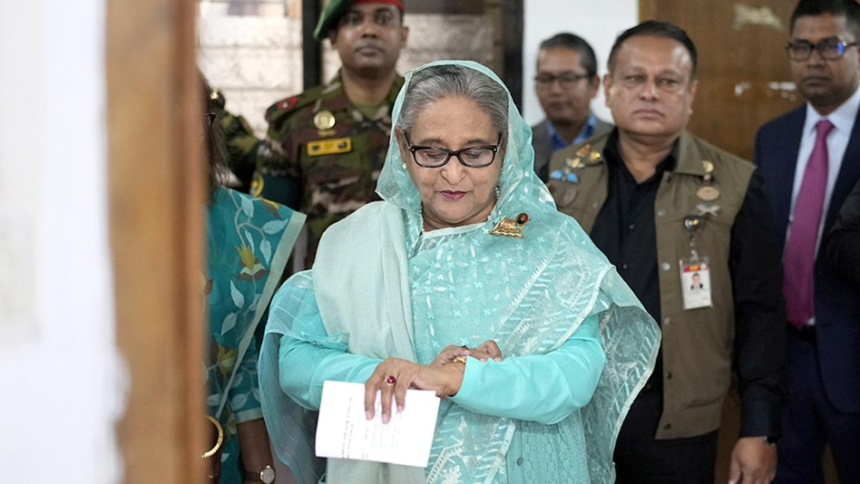Introduction
Sheikh Hasina a dramatic escalation in diplomatic tensions between Bangladesh and India, the Bangladesh government has formally requested India to return its ousted Prime Minister, Sheikh Hasina, who has been living in exile in India for several years. The move comes after mounting political turmoil in Bangladesh and a series of high-stakes diplomatic maneuvers between the two neighboring countries. Bangladesh’s Home Advisor, Jahangir Alam, confirmed on December 23, 2024, that his office had sent a note verbale to the Indian government asking for Hasina’s extradition, officially marking an unprecedented moment in their bilateral relations.
While India has long maintained its position of providing refuge to political exiles, particularly during times of crisis, this latest development could lead to significant consequences in not just bilateral ties but also regional geopolitics. The diplomatic exchange is taking place amidst escalating domestic unrest in Bangladesh and accusations of human rights violations by the current government under Prime Minister Sheikh Hasina’s leadership.
This article delves into the background of the current crisis, historical context, political ramifications, and the possible outcomes of the unfolding situation.  For the more information click on this link
For the more information click on this link
1. Background to the Political Crisis in Bangladesh
Sheikh Hasina’s Political Legacy and Ouster
Sheikh Hasina, a prominent figure in Bangladesh’s political landscape, has served as Prime Minister for multiple terms. Known for her robust economic reforms and efforts towards modernization, she remains a polarizing figure within the country. The rise to power of her Bangladesh Awami League (AL) party has been marked by heavy-handed political maneuvering and a focus on stability that has garnered both domestic praise and condemnation.
Hasina’s government, however, has been fraught with controversies, including allegations of cracking down on political opposition, stifling dissent, and curtailing media freedoms. By 2022, escalating protests and calls for reforms from the opposition resulted in Hasina being ousted following mass unrest. After her forced resignation, she fled the country and sought refuge in India, where her allies have been actively engaged in lobbying efforts to maintain her position internationally.
The Political Landscape in Bangladesh Today
Since Hasina’s ouster, Bangladesh has been navigating a highly contentious political climate. The Bangladesh Nationalist Party (BNP) and its allies, including the Jatiya Party and several minor opposition parties, have vocally criticized the Awami League-led administration for alleged corruption, human rights abuses, and authoritarian practices. The ruling party has countered these claims by accusing the opposition of fostering political instability and undemocratic tendencies.
2. Bangladesh’s Formal Request for Extradition
Home Advisor Jahangir Alam’s Announcement
On December 23, 2024, Jahangir Alam, the Home Advisor to Bangladesh’s current administration, made a public statement confirming that a note verbale had been issued to the Indian government. In the note, Bangladesh formally requested India to facilitate the extradition of Sheikh Hasina, accusing her of inciting violence and undermining the state during her time in power.
“Hasina’s role in the political instability that gripped Bangladesh is not only a matter of concern for our country but also affects the region,” said Alam. “Her presence in India as a political refugee is problematic, and her return to Bangladesh will allow the nation to heal and move forward from the past.”
Extradition Process Under Diplomatic Norms
The request for Sheikh Hasina’s extradition is the first time such a measure has been officially attempted by Bangladesh. Under international law, extradition is typically a complex process, with considerations of whether the individual facing the request has committed crimes in the requesting country that warrant such a procedure. India, as a democratic state and a key player in South Asia’s geopolitical calculus, must navigate delicate legal and diplomatic frameworks in responding to such an unusual request.
While Bangladesh contends that the political charges against Hasina warrant her return to stand trial, India has not yet commented on the matter. However, concerns have already emerged regarding the possible international consequences if India decides to grant this request. Many argue that it may set a dangerous precedent for the treatment of political exiles in South Asia, potentially increasing tensions with opposition groups in India, particularly if Hasina’s return leads to further political instability in Bangladesh.
3. The Dynamics of India-Bangladesh Relations
India’s Role as a Diplomatic Player
For decades, India has acted as a stabilizing force in South Asia, particularly in matters related to Bangladesh. India’s support for Bangladesh’s independence during the 1971 Liberation War, combined with economic and military collaborations over the years, has established a deep bilateral relationship. The two countries have worked together on matters ranging from trade and energy to regional security issues, including counterterrorism.
India has traditionally offered shelter to many political exiles, but the question of whether it would extradite a former head of state like Hasina is a highly sensitive matter. Providing sanctuary for political figures from neighboring countries has been part of India’s international diplomacy, but this precedent is usually upheld only when the safety of those figures aligns with India’s regional interests.
Current Diplomatic Tensions
The diplomatic relationship between India and Bangladesh has seen its ups and downs, with issues like water-sharing treaties, trade disputes, and border security disputes causing friction. However, this extradition request adds an entirely new layer of complexity. If India were to deny or accept the request, it would undoubtedly impact its relationship with Bangladesh.
India’s support for Hasina’s position in her time of exile has been backed largely by humanitarian principles, but it also provides India with leverage over Bangladesh’s domestic politics. Allowing her extradition could be seen as aligning more closely with Bangladesh’s current government, Sheikh Hasina a move that could alienate the political factions opposed to the ruling party in Dhaka.
4. The Legal and Ethical Considerations
Extradition Law Between India and Bangladesh
Extradition treaties are governed by specific protocols that involve detailed scrutiny of international conventions and bilateral agreements. India and Bangladesh share an extradition treaty dating back to 1976, which allows for the formal transfer of criminal suspects. However, Sheikh Hasina political leaders accused of involvement in governmental disputes or acts deemed as political in nature, such as Hasina’s case, complicate matters.
Hasina’s extradition would require careful consideration of not only Bangladesh’s legal standing but also India’s own position regarding the protection of political exiles and human rights. India’s legal and judiciary systems could pose significant challenges in preventing or processing any potential extradition.
Diplomatic Considerations Beyond the Law
The diplomatic optics of this request also cannot be ignored. At a time when regional powers are vying for influence in South Asia, Sheikh Hasina India’s stance on this issue could have repercussions on its image as a promoter of democracy and human rights in the region. For Bangladesh, this extradition could offer political relief but may also fuel domestic discontent as the opposition accuses the ruling party of manipulation.
5. Potential Outcomes and Global Reactions
Impact on Bangladesh’s Domestic Politics
If Hasina is extradited back to Bangladesh, it could trigger political unrest. The opposition, already critical of her leadership, may accuse the government of using the extradition to silence a critical political figure, Sheikh Hasina inflaming protest movements. Bangladesh’s courts and the political establishment will be under heavy scrutiny if such a dramatic return takes place.
Conversely, if India decides to deny the extradition request, it may serve as a blow to Bangladesh’s government, further complicating efforts to stabilize the political environment. International entities, including the United Nations, may find it difficult to navigate the fallout, Sheikh Hasina as they balance regional peacekeeping efforts with respect for national sovereignty.  For the more information click on this link
For the more information click on this link
Global Diplomatic Fallout
International reactions to India’s decision will largely depend on the outcome. Countries concerned about South Asia’s security situation, such as the U.S., China, and the United Kingdom, Sheikh Hasina may either praise or criticize the decision, depending on how it affects regional stability and international relations.
Conclusion
The request for Sheikh Hasina’s extradition highlights the vulnerability and complexity of political leadership in volatile regions like South Asia. While it underscores the intense political rift in Bangladesh, it also puts India in a position where it must weigh its diplomatic, legal, Sheikh Hasina and ethical commitments to decide the fate of a former prime minister.
With the extradition process only beginning to unfold, it remains to be seen how India will respond to its neighbor’s demand. The request could either deepen the divide between the two countries or foster renewed cooperation, depending on the outcome. The world watches as these two nations navigate a sensitive and unprecedented diplomatic crisis. ALSO READ:-Only 12 Trucks Delivered Food, Water in Northern Gaza Since October: Oxfam Highlights Crisis 2024





